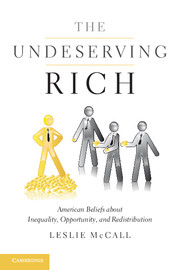Book contents
- Frontmatter
- Contents
- Tables and Figures
- Preface and Acknowledgments
- Introduction: Thinking about Income Inequality
- 1 Beyond the Opposition between Opportunity and Inequality
- 2 The Emergence of a New Social Issue
- 3 American Beliefs about Income Inequality
- 4 Why Do Americans Care about Income Inequality?
- 5 Americans' Social Policy Preferences in the Era of Rising Inequality
- Conclusion: A New Era of Beliefs about Inequality
- Notes
- References
- Index
Conclusion: A New Era of Beliefs about Inequality
Published online by Cambridge University Press: 05 April 2013
- Frontmatter
- Contents
- Tables and Figures
- Preface and Acknowledgments
- Introduction: Thinking about Income Inequality
- 1 Beyond the Opposition between Opportunity and Inequality
- 2 The Emergence of a New Social Issue
- 3 American Beliefs about Income Inequality
- 4 Why Do Americans Care about Income Inequality?
- 5 Americans' Social Policy Preferences in the Era of Rising Inequality
- Conclusion: A New Era of Beliefs about Inequality
- Notes
- References
- Index
Summary
“[At the end of World War II], the basic American promise was that if you worked hard, you could do well enough to raise a family, own a home, send your kids to college, and put a little away for retirement.…The defining issue of our time is how to keep that promise alive.…We can either settle for a country where a shrinking number of people do really well, while a growing number of Americans barely get by. Or we can restore an economy where everyone gets a fair shot, everyone does their fair share, and everyone plays by the same set of rules.”
– President Obama, 2012 State of the Union addressAfter opening his 2012 State of the Union address by paying tribute to the men and women in uniform, President Obama turned his attention to what he called “the defining issue of our time.” Eschewing the cliché of the “American dream” in favor of what he called the “American promise,” he nevertheless went on to sound the dream's key notes: if you work hard and play by the rules, you should enjoy a financially secure life and pass on an even better one to your children. As in other speeches, Obama relied on the example of his grandparents to humanize his argument. His grandfather served as a soldier in World War II, and his grandmother as a laborer on a bomber assembly line. They embodied a generation and an era that “gave rise to the largest middle class and the strongest economy that the world has ever known.”
- Type
- Chapter
- Information
- The Undeserving RichAmerican Beliefs about Inequality, Opportunity, and Redistribution, pp. 219 - 232Publisher: Cambridge University PressPrint publication year: 2013



